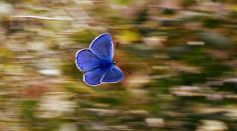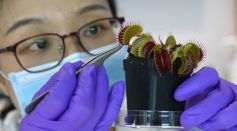Tags: Nature
Why Is Blue So Rare? Unraveling the Mystery of Its Scarcity in the Natural World
Nature's Micro Marvels: Scientists Spotlight the World's Tiniest Species, From Nano-Chameleons to Miniature Frogs

Nature vs Nurture: How Our Genes and Environment Shape Our IQ
Unraveling Nature's Enigma: The Top 5 Bizarre Weather Phenomena That Defy Explanation

AI Might Help Humans Talk to Animals, Opening New Doors for Communicating With Nature

Saving One Butterfly Species Fueled a Collaborative Nature of Survival, Rescuing a Whole Ecosystem

Links Between Nature and Human Well-Being Revealed in Review of Over 300 Articles on Cultural Ecosystem Services

Mazes & Brain Games Experience Opens May 20 at the Denver Museum of Nature & Science
New Strategy in Engineering Mixes Industrial Plastic with Carbon Nanotubes to Devise Tougher, Stronger, Smarter Materials

Alligator Found Scratching at Florida Home’s Front Door as Mating Season Starts [LOOK]

Nanoscale Machines Devised for Greater Functions Inspired by Nature

Venus Flytrap Plays Vital Role in Brain-Machine Interface Shown Using Artificial Neurons

Identical Twins Sharing Nearly the Same Genes More Inclined Towards Natural Spaces

Scientists Successfully Reintroduce Extinct Fish That Fits Palm of the Hand After 20 Years

Pandemic Lockdown Affects Children’s Mental Health; New Study Shows More Playtime in Nature Means Less Behavioral Problems in Kids

Greenspaces Near Schools and Homes: Research Shows the Role of Nature in Keeping Children Healthy

Pesticide Is The Reason Bees Are Not Getting Adequate Sleep

Carbon Sinks Can Help Stop Climate Change

Insects Can Be an Essential Teaching Tool for Children - Researchers
What Are Colloids and Why Are They Important?
Most Popular

Ancient Hotspot Found to Have Created Great Lakes 300 Million Years Ago

Mysterious Structures Discovered Beneath the Pacific Ocean, Puzzle Scientists

Largest Known Volcanic Aquifer Discovered Beneath Oregon's Cascades

New 'Supergiant' Sea Bug Found in South China Sea, Named After Darth Vader





